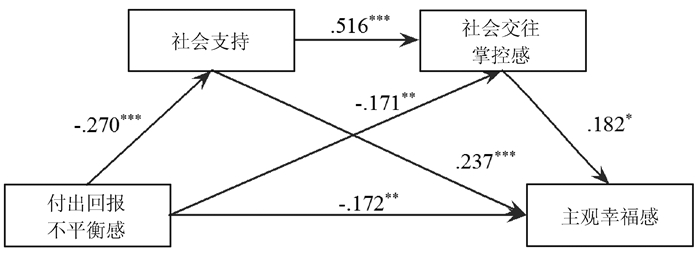全文HTML
-
家庭生活是老年人生活的核心,因此,理解老年人的家庭压力是改善老年人生活质量的关键。最近,付出回报不平衡模型是得到广泛承认的压力模型之一,该模型假设付出高于回报就会产生心理不平衡感,而心理不平衡感就会导致个体出现负性情绪和持续的压力反应。大量的实证研究也发现,ERI和生理健康以及心理健康密切相关[1]。ERI得分越高,个体感知到的家庭支持越低,感知到的家庭压力越大。研究发现对于老年人来说,和家庭成员之间的密切接触能导致更大的积极和消极情感,和朋友的密切接触能导致更高水平的生活满意感和积极情感,而不会导致更低水平的消极情感[2]。一些研究也发现情绪上的不平衡感和情绪幸福感负相关,而这些只表现在老年人身上,年轻人则不存在这种关系[3]。
对有关社会支持研究的总结发现,社会支持不仅能直接影响身心健康,而且还会作为中介变量或通过其他中介变量来影响身心健康[4]。大量的实证研究也支持社会支持可以作为一个中介变量。例如,一些研究发现社会支持可以中介社会经济地位对心理健康的作用[5],也可以中介社会经济地位对身体健康的影响[6]。因此,我们假设老年人家庭ERI能直接负向预测主观幸福感(SWB);社会支持部分中介老年人家庭ERI对SWB的负向影响。掌控感是指一种信念,这种信念认为个体自己能掌控所有的生活改变。掌控感来源于特定领域的自我效能感,掌控感会转化成一种持续的自信,相信自己有能力处理新的挑战和压力,减少消极情绪提高幸福感[7]。并且研究者发现掌控感更多关注对自己的影响,是一个重要的中介变量[8]。因此,我们假设社会交往掌控感能部分中介老年人家庭ERI对SWB的负向影响。
尽管有大量的研究发现社会支持和SWB正相关[9],但也有一些研究者指出社会支持改善SWB的机制仍不清楚。研究者对国内社会支持和主观幸福感的关系的元分析发现二者之间的相关受被试群体类型的调节[10]。因此很多研究开始关注社会支持影响主观幸福感的作用机制。例如,研究发现自尊、孤独分别在社会支持与主观幸福感之间起完全中介作用[11]。研究发现掌控感和社会支持正相关,并均能正向预测主观幸福感。而且研究也发现健康掌控感在社会支持和健康之间起部分中介作用[12]。因此我们假设社会支持通过社会交往掌控感部分中介老年人的家庭付出不平衡感对主观幸福感的负向影响。
早期的ERI问卷主要是针对工作情景的,虽然有研究已经开发了专门针对老年人的工作之外的ERI问卷,但该问卷并不符合ERI模型的理论设想,而且该问卷所包含的特定的公民角色这一维度并没有反映老年人的家庭生活。最近,一些研究者也开发了适合家务劳动的ERI问卷[13],但该问卷将回报维度划分为四个子维度,这对于老年人来说过于复杂,而且内在价值和社会尊重这两个子维度并不能完全反映家庭生活,我们需要开发适合于老年人家庭生活的ERI问卷。因此本研究的目的是修编适合老年人家庭生活的付出回报不平衡感问卷,并在此基础上探讨老年人付出回报不平衡感对其主观幸福感的作用机制。
-
由于本研究的关键是分析中介效应,根据因果关系对前因变量和后果变量在时间上先后顺序的要求,本研究采用追踪设计。首先对被试施测老年家庭版ERI、社会支持问卷、社会交往掌控感问卷和老年抑郁问卷以及人口学信息,二周后对同一批被试再次施测主观幸福感问卷。
有效研究对象共233人,男性87人(占37.3%)、女性144人(占61.8%)、2人没有报告性别。年龄范围在53-84岁,平均年龄64.7岁(SD=6.2)、其中5人没有报告年龄。未婚4人(占1.7%)、已婚196人(占84.1%)、离婚7人(占3.0%)、分居2人(占0.9%)、丧偶17人(占7.3%)、再婚4人(占1.7%)、其中2人没有报告。具有小学及以下文化程度1人(占0.4%)、初中25人(占10.7%)、高中或中专66人(占28.3%)、大专61人(占26.2%)、本科及以上73人(占31.3%)、其中7人没有报告。
-
1.修编的老年人家庭版ERI问卷:根据老年人家庭生活的特点,修编了来自于非互惠社会关系问卷和家务劳动版ERI问卷的相关题项,并对老年人进行了访谈,增加了一些新题项。为了使量表的表述适合老年人,又对老年家庭版ERI量表的题项逐一进行了访谈并修改,最后形成了包括14个题项的老年人家庭版ERI问卷,具体见表 1。该问卷包括三个维度:(1)付出维度包括5个题项,主要测量了老年人对家庭生活的付出程度;(2)回报维度包括5个题项,主要测量配偶/伴侣以及子女的尊重;(3)过度承诺维度包括4个题项,主要测量了老年人从家庭生活中摆脱出来的能力。采用5点李克特评分。通过计算付出回报比率(effort-reward ratio)来反应家庭付出回报不平衡感的程度,付出回报比率等于付出得分除于回报得分,大于1表明付出回报不平衡,数值越大表明家庭付出回报不平衡感越强。
采用非互惠社会关系问卷作为效标。非互惠社会关系问卷包含9个题项三个维度,本研究中婚姻交换、父母子女交换和非特定信任关系交换三个维度和总问卷的Cronbach alpha系数分别为0.65,0.76,0.80和0.73。老年家庭版ERI问卷的其他心理测量学指标具体见结果部分的表 1-表 3。
2.交流社会支持量表:采用中文版的交流社会支持量表[14],该量表分为日常情绪支持、问题指向的情绪支持、社交朋友、日常工具性支持和问题指向的工具性支持。共23个项目,采用李克特4点计分。得分越高,感知到的社会支持越高。本研究中的总量表的Cronbach系数为0.88,日常情绪支持、问题指向的情绪支持、社交朋友、日常工具性支持和问题指向的工具性支持各个分维度的Cronbach系数分别为0.73,0.75,0.74,0.63和0.69。
3.社会交往掌控感量表:社会交往掌控感量表由Nelson编制,用来测量个体知觉到的社会交往生活是否处于自己的控制之中,而非为命运所支配[15]。问卷共11个项目,比如“我随时可以招待朋友们”,“我随时能找人打扑克或参与其他团体活动”。采用李克特5点计分,从1“非常不同意”到5“非常同意”。得分越高表明个体感觉到自己越能掌握自己的社会交往生活。本研究中量表的Cronbach系数为0.77。
4.主观幸福感量表:主观幸福感量表分为生活满意度、积极情绪和消极情绪三个分量表[16],采用李克特7点计分。本研究中生活满意度、积极情绪和消极情绪三个分量表以及总量表Cronbach系数分别为0.87、0.78、0.91和0.81。
5.老年抑郁问卷:该问卷共30个项目,采用是与否记分,得分范围为0~30分,得分越高,抑郁程度越高[17]。得分9以下表明情绪正常,得分10到19,表明具有轻度的抑郁症状,得分20以上表明具有严重的抑郁[18]。
-
采用SPSS 22.0和Mplus 7.0进行分析。首先,根据抑郁标准,共删除4个得分高于20的被试以排除严重抑郁对研究结果的影响。其中得分为20的2个被试,得分23的1个被试,得分为29的1个被试。其次,考察老年家庭版ERI的各种心理测量学指标。最后,进行描述统计分析,考察老年人家庭ERI、社会支持、社会交往控制感和主观幸福感的平均得分,采用Pearson相关分析考察变量间的关系,然后在相关模型的基础上,考察社会支持和社会交往控制感在老年人家庭ERI和主观幸福感关系中的多重中介作用。考虑到样本量的限制,本研究中的所有变量均采用总分作为显变量进行模型分析。
-
采用Harman单因子检验对共同方法偏差进行统计控制,结果表明未旋转和旋转后均得到31个因子,未旋转和旋转后得到的第一个因子的因子负荷分别为14.06和6.88,解释量分别为12.55%和6.14%。均远远小于40%的临界值。因此,本研究不存在明显的共同方法偏差。
一. 研究对象
二. 测量工具
三. 数据处理
四. 共同方法偏差的检验
-
如表 1,付出、回报和过度承诺以及付出回报比率各自的平均数(标准差)分别为3.09(SD=0.51),2.94(SD=0.44),2.63(SD=0.68)和1.09(SD=0.32)。付出、回报、过度承诺和总量表的Cronbach alpha系数见表 1,题项和总分之间的相关系数见表 1。
-
表 2表明,探索性因素分析结果支持老年人家庭版ERI问卷的三因素理论模型,三个因素分别命名为付出、回报和过度承诺。三个因素的累积解释量为61.96%。
-
如表 3,以非互惠社会关系问卷为效标的分析结果表明,付出回报比率和非互惠社会关系问卷的三个维度之间的相关系数分别为-0.33、-0.34和-0.45,均为中等程度的负相关,表明修编的老年人家庭版ERI问卷具有较好的效标关联效度。
-
表 4表明各变量之间呈中等程度的正相关或负相关,适合继续进行中介分析。
-
控制了年龄、性别、学历和抑郁之后,所有三条间接路径和一条直接路径都显著。表 5和图 1表明,第一条中介路径是社会支持部分中介家庭ERI对SWB的消极影响(IE1=a1b1=-0.064,95%C.I.=-0.014,-0.115,p=0.013),该路径说明社会支持能有效降低老年人高水平的家庭付出回报不平衡感对主观幸福感的消极影响。第二条中介路径是社会交往掌控感能部分中介家庭ERI对SWB的消极影响(IE2=a2b2=-0.031,95%C.I.=-0.005,-0.067,p=0.087),该路径说明社会交往掌控感能有效降低老年人高水平的家庭付出回报不平衡感对主观幸福感的消极影响。第三条中介路径是社会支持通过影响社会交往掌控感部分中介家庭ERI对SWB的消极影响(IE3=a1db2=-0.025,95%C.I.=-0.001,-0.005,p=0.042),该路径说明社会支持能提高其社会交往掌控感,一起有效降低老年人高水平的家庭付出回报不平衡感对主观幸福感的消极影响。三条中介路径的间接总效应非常显著(IEt=IE1+IE2+IE3=-0.121,95%C.I.=-0.065,-0.176,p=0.000)。家庭ERI对SWB的直接效应非常显著,(c'=-0.172,95%C.I.=-0.055,-0.290,p=0.004),该路径说明老年人高水平的家庭付出回报不平衡感能直接导致主观幸福感的降低。
三条中介路径的间接效应占总效应的百分比分别为21.9%、10.7%和8.7%,这说明单独通过社会支持能解释总变异的21.9%,单独通过社会交往掌控感能解释总变异的10.7%,通过社会支持和社会交往掌控感一起能解释总变异的8.7%,而老年人家庭付出回报不平衡感对主观幸福感的直接作用能解释总变异的58.7%。
一. 老年人家庭版ERI问卷的描述统计结果及内部一致性信度系数
二. 老年人家庭版ERI问卷的结构效度
三. 老年人家庭版ERI问卷的效标关联效度
四. 各个变量的平均数、标准差、最小值、最大值及其各变量之间的相关
五. ERI对SWB影响的二重中介效应检验
-
本研究的目标之一是修编一个适合于老年人家庭生活的家庭付出回报不平衡问卷。研究结果表明,修编的老年家庭版付出回报不平衡感问卷具有较好的心理测量学指标,适用于老年人。本研究的第二个目标是探讨社会支持和社会交往掌控感在老年人家庭ERI对SWB的影响中的中介效应。多重中介模型分析结果表明,在控制了年龄、性别、学历和抑郁程度之后,三条中介效应和一条直接效应路径均显著。老年人家庭ERI能直接导致其主观幸福感的降低,该直接效应占总体效应的58.7%,这说明老年人家庭ERI对SWB的直接作用是非常重要的。另外,老年人家庭ERI还能通过社会支持和社会交往掌控感间接影响老年人的主观感幸福感。第一条中介效应路径表明,老年人对家庭的付出高于回报,就会产生家庭付出回报不平衡感,不平衡感越高,其感知到的社会支持越低,从而降低老年人的主观幸福感;第二条中介效应路径表明,老年人的家庭付出回报不平衡感越高,其社会交往掌控感越低,从而降低了老年人的主观幸福感;第三条二重中介效应路径表明,老年人的家庭付出不平衡感越高,其感知到的社会支持越低,进而减低了其社会交往掌控感,导致了老年人主观幸福感的降低。
-
对于中国老年人来说,家庭生活极其重要,甚至是老年人生活的全部,因此,来自于家庭的压力可能是影响老年人心理健康的重要因素。该研究结果表明,老年人家庭ERI能直接导致其SWB的降低,而且该条直接路径占总体效应的58.7%,这和已有的研究结果一致。大量的研究发现,和家庭成员之间交换导致的不平衡能带来更大的压力[19-20]。因为来自于家庭成员的这种不平衡感,老年人并不能根据自己的喜好和意愿随意结束这种关系,从而降低社会交换造成的不平衡感。
-
大量的研究表明社会支持能有效保护压力对主观幸福感的消极影响[21-22]。特别是对于老年人来说,社会支持尤为重要,因为老年人在认知领域和健康领域逐渐开始老化[7],而社会领域是唯一保持相对完好的领域,因此老年人倾向于选择保持更加紧密的社会互动来提高其主观感幸福感[23]。有研究者认为如果个体感知到的社会支持水平较高,他们就会重新评估压力事件和降低压力事件的重要性[24]。即当老年人感知到的社会支持较高,老年人就会重新评估家庭压力,降低家庭压力对老年人生活的重要性,从而降低家庭ERI对老人主观幸福感的消极影响。
-
老年人家庭ERI不仅会通过社会支持降低家庭ERI对SWB的消极影响,而且还会通过社会支持和社会交往掌控感降低家庭ERI对老年人主观幸福感的消极作用。掌控感是指个体相信自己能对外界环境和内心感受施加改变和操纵的知觉,即相信自己能在多大程度上影响活动的结果。掌控感是一种保持心态平衡的重要心理资源,掌控感决定着个体能否积极主动地改善自己的处境。经过和环境的经常互动,个体逐渐获得了这样的信念,即他有能力掌控自己的生活,这种信念具体到社会交往领域就是社会交往掌控感。一些研究强调作为努力掌控环境和内部冲突的应对策略的重要性以及自我掌控是一种重要的个人应对资源[25]。有研究者对相关研究的总结发现对环境的掌控感是影响主观幸福感的重要因素[26]。根据社会学习理论,个体和环境的交互作用影响掌控感的形成,如果个体经历了较多的失败控制努力容易形成外控感,相反就相信事情是自己可以控制的,即我们所说的掌控感[27]。社会支持是一种重要的强化物,社会支持能直接强化行为,或者通过对强化的期待(掌控感)间接影响行为[28]。有研究发现掌控感高的个体能更好地利用其社会网络,能更有效地利用社会支持降低压力[29],这是因为掌控感高的个体能更工具化地利用社会支持,更可能积极地去寻求信息,更加积极地采取任务取向的行为以及采用更加适应性的应对方式去处理压力事件[30]。研究发现社会支持水平低下、外控心理倾向的人主观幸福度低,心理症状多,心理健康水平低[31]。掌控感可以成功地处理压力以及减少消极情绪[32]。因此,社会支持能提高社会交往掌控感,而掌控感能直接影响老人的主观幸福感,也可以作为一个中介变量在社会支持和主观幸福感之间起中介作用。
-
本研究的结论说明可以单独通过改变老年人的家庭ERI、社会支持或者社会交往掌控感提高老年人的主观幸福感,也可以通过改变老年人的家庭ERI和社会支持的联合,老年人的家庭ERI和社会交往掌控感的联合以及老年人的家庭ERI、社会支持和社会交往掌控感三者的联合来提高老年人的主观幸福感,这对未来提高老年人生活质量的干预研究具有一定的实践意义。虽然本研究对于改善老年人生活质量具有一定价值,但本研究也存在几点不足,第一,我们假设老年人家庭ERI能导致SWB而不是SWB能导致家庭ERI,但是横断研究设计不能解释因果关系,本研究虽然采用了时隔两周的追踪研究设计,但由于时间、经济等因素追踪的时间较短,未来的研究需要更长的追踪时间来进一步验证该研究结论。第二,本研究的所有数据均是来自老年人的主观报告,虽然我们也检验了共同方法偏差的问题,但并没有完全排除共同方法偏差的影响,未来的研究需要采用其他的研究设计来避免该问题。第三,本研究的被试并不是完全随机或者分层系统取样,因此当我们把该研究结果概化到其他老年群体的时候需要谨慎,特别是其他国家和文化的老年人并不像中国老年人那样把家庭生活看作生活的核心。




 下载:
下载: